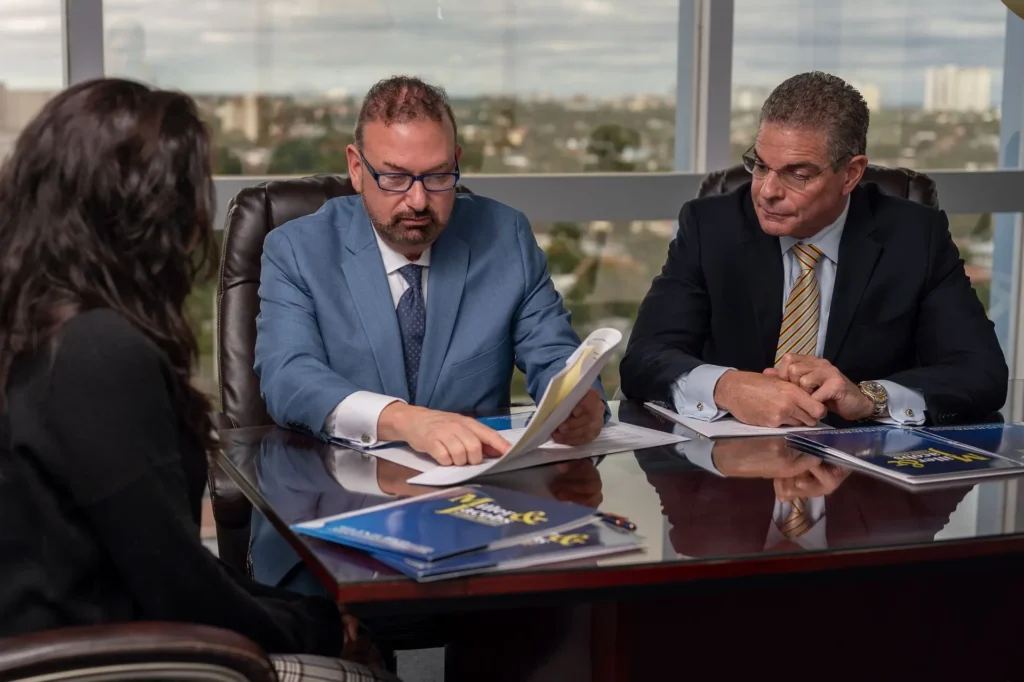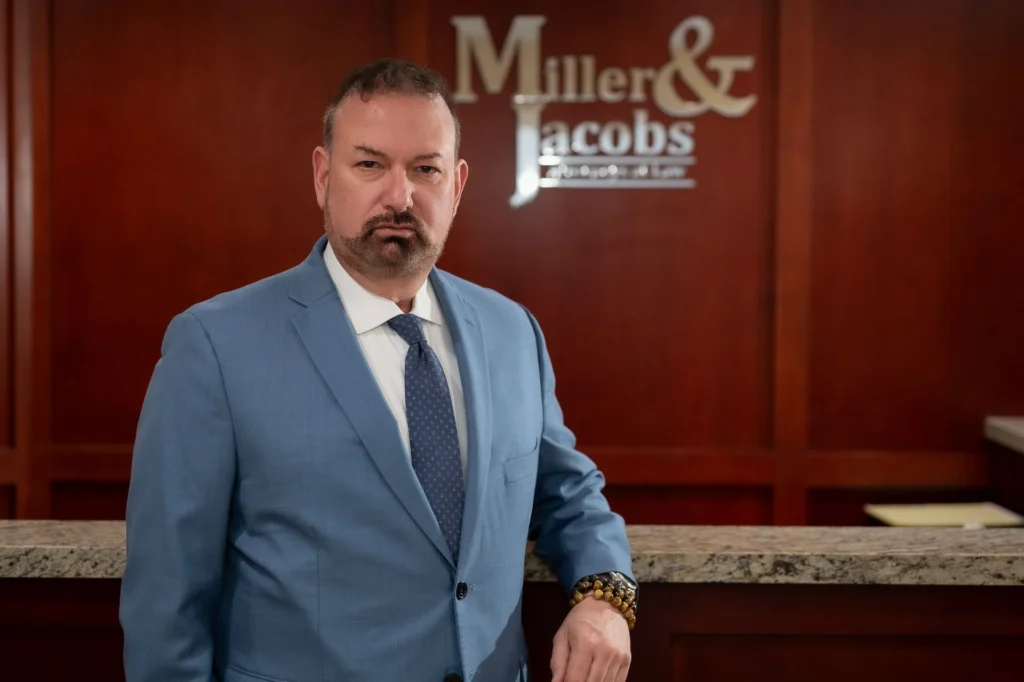When families place their loved ones in nursing homes, they trust these facilities to provide care, safety, and respect. That trust is sometimes broken.
If your loved one has suffered abuse or neglect in a long-term care facility, a Pompano Beach nursing home negligence attorney can help you protect their rights and pursue justice. Florida has one of the largest elderly populations in the country, and nursing home negligence is a growing concern in cities like Pompano Beach.
These cases are not just about physical harm. They can involve emotional abuse, financial exploitation, and the silent suffering of those who cannot defend themselves.
Why Choose Miller & Jacobs for Your Pompano Beach Nursing Home Neglect Claim
- Over 50 years of combined experience in Florida personal injury law
- More than $90 million recovered for injury victims
- Offices in Pompano Beach and Orlando for convenient access
- No fees unless we win your case
- Compassionate attorneys who treat every client with respect
What Qualifies as Nursing Home Negligence?

Nursing home negligence takes many forms. Understanding what counts as neglect Pompano beach personal injury attorney is the first step to protecting your loved one.
Nursing home negligence includes failure to provide basic needs, such as food, water, hygiene, medication, and safe living conditions.
Some signs of neglect include:
- Bedsores or pressure ulcers
- Malnutrition or dehydration
- Frequent falls or unexplained bruises
- Soiled clothing or bedding
- Emotional withdrawal or depression
- Infections due to poor hygiene
- Difference between abuse and neglect
While abuse involves intentional harm, neglect often results from inaction. Staffing shortages, poor training, or careless oversight can all contribute to negligent care. Both are serious and can lead to physical and emotional trauma.
Legal definition in Florida
Under Florida Statute §415.102, neglect is defined as the failure of a caregiver to provide goods or services necessary to maintain the health of a vulnerable adult. This includes actions that place the person at risk of harm.
How Do I Know If My Loved One Is Being Neglected?
Neglect isn't always visible. Many residents fear retaliation or cannot communicate their suffering.
Behavioral changes
Watch for shifts in behavior. If your loved one seems unusually anxious, depressed, or reluctant to speak when staff are around, it may be a red flag.
Physical indicators
Bruises, sudden weight loss, or infections could signal a larger problem. Unexplained hospital visits or frequent falls also merit concern.
Feedback from other residents
If others in the facility have made similar complaints or seem fearful, this could point to systemic issues.
What Should I Do After Discovering Neglect?

Taking the right steps can preserve your case and protect your loved one.
Document everything
Take photographs of injuries, living conditions, and anything that seems unusual. Keep a written log of dates, conversations, and observations.
Report the incident
You can report nursing home abuse or neglect to the Florida Department of Children and Families (DCF) by calling their Abuse Hotline at 1-800-962-2873.
Consult a nursing home negligence attorney
Legal support helps ensure your loved one’s needs are taken seriously. An experienced lawyer can guide you through legal options and next steps.
What Laws Protect Nursing Home Residents in Florida?

State and federal laws are designed to uphold safety and dignity in elder care.
Florida statutes and regulations
Florida law requires nursing homes to meet specific care standards. Facilities must maintain proper staffing levels, keep accurate medical records, and follow care plans.
Federal protections
The Nursing Home Reform Act of 1987 mandates that residents have the right to be free from abuse, neglect, and exploitation. This law is enforced through inspections and penalties.
Resident rights
Under Florida law, residents have the right to privacy, respect, proper medical care, and the ability to voice grievances without fear of punishment.
How Much Compensation Can We Get in a Nursing Home Negligence Case?
The compensation amount depends on the severity of the harm and related costs.
Economic damages
These include medical bills, hospital stays, rehabilitation, and the cost of moving to another facility. If the neglect results in death, funeral expenses can also be recovered.
Non-economic damages
Pain, suffering, emotional distress, and loss of companionship are harder to measure but still important. Florida law allows families to seek compensation for these damages.
Punitive damages
In extreme negligence or abuse cases, punitive damages may be awarded to punish the wrongdoer and deter similar conduct.
How Common Is Nursing Home Negligence in Pompano Beach?
Nursing home negligence is a concern across Florida, including Pompano Beach.
State inspection reports
The Agency for Health Care Administration (AHCA) regularly inspects Florida nursing homes. Several facilities in Pompano Beach have been cited for violations, ranging from unsanitary conditions to medication errors.
Local statistics
According to AHCA data, complaints of elder abuse in Broward County have risen steadily in recent years. Pompano Beach, home to several long-term care facilities, is part of this trend.
Community resources
Local agencies, such as the Broward County Elderly and Veterans Services Division, provide support for families navigating elder care issues.
How Can I Keep My Loved One Safe Without Moving Them?
Families often feel torn between staying quiet or immediately relocating their loved ones. But you can improve conditions while keeping them where they are.
Increase your presence
Try to visit at different times throughout the week. Let staff know you’re involved and watching. Random visits can help discourage neglect and make your loved one feel supported.
Ask for care plan updates
Every resident should have a care plan on file. Request that the nursing staff review this plan and ask for any necessary updates. You can request more frequent checks, therapy sessions, or routine changes.
Use written communication
When you request or raise a concern, follow up in writing. Keep records of emails, letters, and responses. This creates a paper trail that can help improve accountability within the facility.
Report, even while staying
You don’t have to move your loved one to file a report. Florida agencies accept anonymous tips and formal complaints. If conditions don’t improve or if retaliation occurs, you’ll already have a history of documentation to support further steps.
How Can Miller & Jacobs Help With My Case?
You don’t have to handle this alone. Miller & Jacobs brings legal knowledge and compassionate guidance to every case.
Investigation
We start by collecting evidence, including medical records, staff logs, and witness statements. We look for patterns of neglect and build a strong legal argument.
Communication
We handle all communication with the nursing home and insurance companies, so you don’t have to. Our goal is to protect your family while keeping you informed every step of the way.
Representation
Whether through settlement or litigation, we fight for your rights. Our firm has recovered over $90 million for injury victims across Florida, including cases of elder neglect.
What If the Nursing Home Staff Dismisses My Concerns?
Raising concerns about poor care isn’t always simple. Some staff may downplay complaints or act annoyed. Others might ignore you completely.
Keep your tone firm but respectful
Speak clearly and directly. Let them know you are serious. Try to stay calm and avoid emotional arguments, but be persistent. Document the date, time, and content of each conversation. If possible, ask a witness to join you.
Put things in writing
Verbal conversations can be denied or forgotten. Follow up with a letter or email describing what happened and what actions you expect. Keep a copy of everything you send.
Ask for a higher-level meeting
If staff are not responding, ask to speak with the facility administrator or director of nursing. Request a formal meeting and prepare a list of concerns. Bring notes, photos, and documentation. Record the meeting if allowed.
If the staff continues to avoid your questions or give vague answers, it may be time to report the facility or seek legal help. Silence and evasion are signs that something is wrong. Don't wait for the situation to get worse.
Can I Legally Step in to Protect My Loved One?
Family members often feel powerless when they suspect something is wrong, especially if they’re unsure of their legal rights.
Know your legal status
Start by confirming whether you have power of attorney or legal guardianship. These documents let you make decisions about your loved one’s care, access medical records, and take action if the facility is failing them. If you don’t have these documents, you may still be able to act with their permission.
Request access to records
If you have legal authority, you can request care plans, treatment notes, and daily logs. You don’t need to accept vague summaries or dismissive answers. You’re entitled to know what kind of care your loved one is getting.
Intervene when care falls short
With legal authority, you can move your loved one to another facility, schedule outside medical evaluations, and even file formal complaints on their behalf. These steps can stop the harm and start the healing.
When documents are missing
If you’re unsure whether you have legal authority or need help getting it, a lawyer can explain your options. Families often assume they need to wait—but delays can make things worse. Taking early steps helps protect your loved one and puts you in a stronger position to demand change.
What If I’m Afraid of Retaliation Against My Loved One?

Speaking up can feel risky when your loved one still lives at the facility. Many families worry that raising concerns could make things worse.
This fear is common and real
People sometimes stay quiet because they don’t want staff to lash out. Retaliation can show up as colder treatment, skipped care, or less attention. If your loved one has limited ways to communicate, this fear grows even more intense.
Take precautions while staying involved
Keep a written record of your concerns and note how staff respond. Try to visit more often or at unexpected times. Regular presence shows that your loved one is not alone. If you’re far away, ask a trusted friend or relative to help.
Use your right to report
Florida law protects nursing home residents from retaliation. If staff treat your loved one differently after you speak up, that can strengthen your case. You have the right to report retaliation just like you can report neglect.
Legal help adds a layer of protection
Having someone else speak for you can reduce tension and lower the risk of retaliation. A lawyer can document everything, step in on your behalf, and help hold the facility accountable for any backlash. You don’t need to do this alone.
What Makes A Good Pompano Beach Nursing Home Negligence Attorney?
Not all lawyers are the same. Choosing the right one can make a big difference.
Experience with local cases
A local attorney understands the facilities, judges, and legal climate in Pompano Beach. This knowledge helps tailor your case to local standards.
Clear communication
You need a lawyer who explains your options, listens to your concerns, and responds quickly. You should never feel left in the dark.
Commitment to justice
This isn’t just about money. It’s about dignity, accountability, and preventing others from suffering the same harm. We take that responsibility seriously.
Ready to Talk? Let’s Do This

Don’t let your loved one suffer in silence. Miller & Jacobs, Accident Attorneys is ready to take your call.
For help with a Pompano Beach nursing home negligence attorney case, dial (877) 848-5297 now. Your family deserves safety, respect, and a powerful voice in the fight for justice.